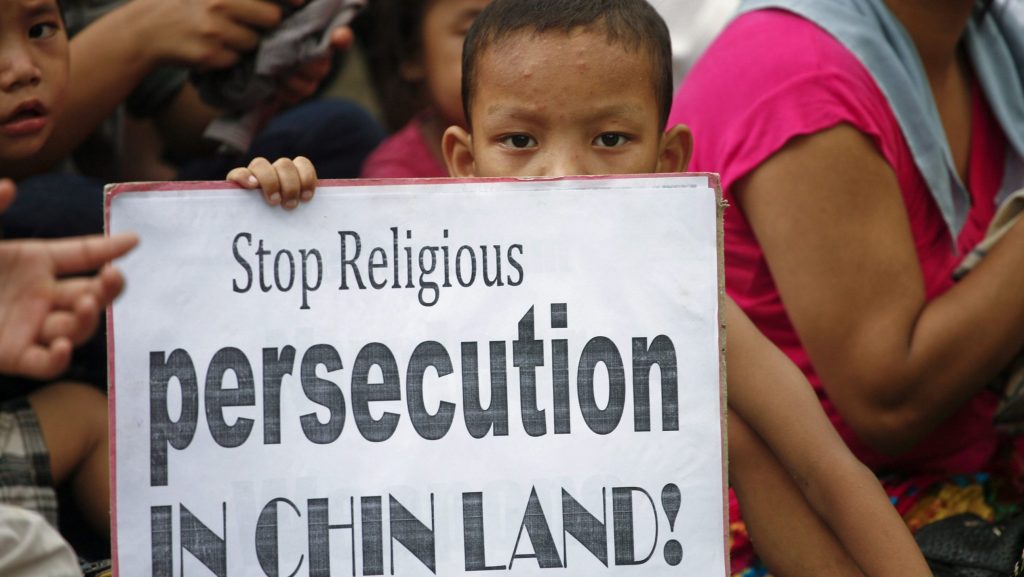U.S. refugee and immigration advocates pressed Oct. 21 for more help for ethnic Chin Christians internally displaced in their native Myanmar, and those who have fled to neighboring India and Malaysia.
Some of the specifics for which they pushed include greater access by Myanmar's military for relief workers to reach internally displaced Christians at numerous camps set up in Chin state; better integration into society of refugee Myanmar Christians now in camps in India and Malaysia; and an opportunity for them to enter the United States as refugees suffering from religious persecution.
The U.S. bishops' Migration and Refugee Services has settled more than 63,000 Chins in the United States over the past two decades, according to Bill Canny, MRS' executive director.
Catholic Relief Services, the U.S. bishops' international aid and development agency, is "one of the several humanitarian agencies providing humanitarian relief" in the region, Canny noted. Chin state borders Rakhine state in western Myanmar; a military campaign to purge Rakhine of its Rohingya Muslim population has resulted in hundreds of thousands of refugees in southern Asia, and deep suffering for those who remain.
Zo Tum Hmung of the Chin Association of Maryland, which sponsored the Oct. 21 press call, cited U.N. High Commissioner for Refugees statistics that showed more than 153,000 Myanmar refugees in Malaysia alone. Two-thirds were Rohingya Muslims, but there also were 22,510 Chins in that number.
Canny was the first of many on the call to advocate for the U.S. raising its cap on the number of refugees facing religious persecution it will admit. The Trump administration said Sept. 30 that it would allow 15,000 refugees into the United States during fiscal year 2021, which for the federal government began Oct. 1.
"We support the commitment to rebuild the program to its historic norms and bring it to 95,000," Canny said. "Resettlement for people fleeing religious persecution would be a way for the administration to champion its stated goal of promoting religious freedom."
Chins "fear religious persecution and a de facto forced assimilation policy," said Krish O'Mara Vignarajah, president and CEO of Lutheran Immigration and Refugee Service. "This is compounded by a lack of access to basic needs ... and now, a global pandemic," she added.
"We've come to know the courage and perseverance of the Chin people who have fled to the United States," Vignarajah said, noting LIRS has resettled nearly 7,000 Chins, including some who had been stranded on Guam.
"They arrive as refugees, but they quickly become our neighbors, our fellow congregants and, ultimately, citizens," she said, adding the Trump administration's 15,000 refugee resettlement figure is "a complete abdication of our moral responsibility as a humanitarian leader."
Such a low number, Vignarajah said, "slams the door shut not only on Chins, but on all people" seeking to flee persecution.
"We do not have a durable solution that will really allow them to thrive in their communities," Jenny Yang, vice president of advocacy for World Relief, said of the Chins. "They cannot integrate local to the communities to which they've fled and they can't return to Myanmar."
Yang added, "Children cannot attend school because they were working to provide food for their families. ... They cannot bury their dead within their communities. They've had to travel long distances even to find land. Many of them felt like perpetual outsiders."
"There's an immediate need for the president to set this goal. It's already three weeks beyond the deadline for setting this goal. Refugees cannot arrive until that number is set," said Matt Wilch, a refugee policy adviser for the U.S. bishops. "There's record displacement across the board. And U.S. humanitarian leadership is very crucial."
By law, the administration had to submit the number to Congress, which it did when the cap was announced; Oct. 26 is the deadline for President Donald Trump to sign it.
The Rev. Stephen Hre Ko, pastor of a Baptist church for Chins in Indianapolis, reported on the success that comes for U.S.-based Chins after times of struggle.
"There are difficulties in culture when they came from Burma (Myanmar's former name) or Malaysia to here," Rev. Ho said. "Our American friends have been helping us, but the primary responsibility is for the refugees themselves to become integrated into society." He gave credit to two local agencies for helping newly arrived Chins adapt to life in the United States.
"Both are helping Chins to learn a language, adjust to a new culture and environment," Rev. Ho said, but "everything is a struggle."
Chin children, once they get to high school, "get very successful," Rev. Ho said. "The graduation level is almost 100%, and 80% go on to college."
"How they get financial assistance I have no idea, but they do go to college," he said. "It is inspiring to see these kids growing up" and getting degrees in law, medicine and theology, he added.
Regarding employment, "as far as I know there is no Chin I know who is not working," and there are about 22,000 Chins in the Indianapolis area, according to Rev. Ho. "Their employment in various companies is quite outstanding. The company CEOs are quite happy," he said, adding that one employer "wants only Chin workers." "That report is very positive," he said.

